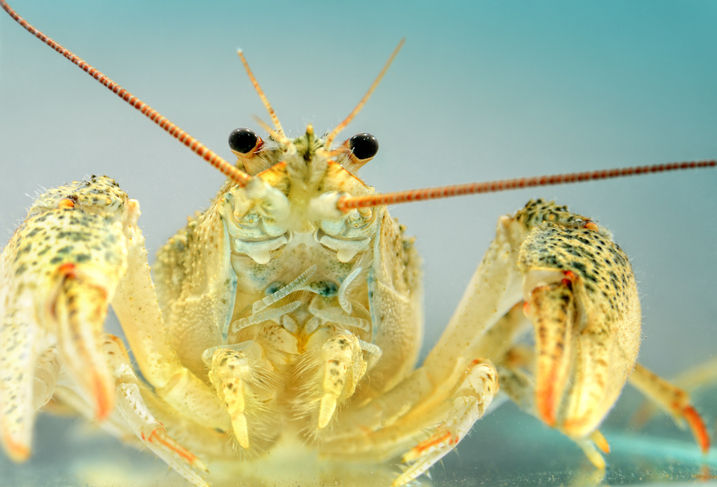Animal Pain Awareness Month
- Sep 14, 2022
- 4 min read
Updated: Sep 21, 2022
September is Animal Pain Awareness Month. Despite feeling pain, animals like crabs and lobsters (decapod crustaceans) are boiled alive, chopped up alive and sent in the post. Learn more about how we know decapods can feel pain, why this is so important, and what you can do to help.

What is Animal Pain Awareness Month?
During September veterinary professionals around the world use the annual Animal Pain Awareness Month to promote the important message of recognising and understanding pain in pet animals. But pain in animals doesn’t just affect pets like cats and dogs, it affects all sentient animals, that this those able to feel pain. This includes animals like crabs and lobsters too!
What is pain and sentience?
Sentience is the capacity to experience feelings, such as feelings of pain, pleasure, hunger, thirst, warmth, joy, comfort and excitement, as well as other feelings that may be unimaginable to humans. Although sentience encompasses a broad range of feelings, pain and suffering are of particular significance when considering animal welfare laws and the ethical treatment of animals.
Pain can be described as having two key parts. The first is a basic, unconscious reflex response to avoid something that will cause harm. The second is a negative felt experience which often triggers a long-term change in behaviour and helps protect from injury in the future. This can be compared to accidently putting your hand on something hot. Before you’ve had a chance to acknowledge it, your body pulls your hand away. That’s part one of a pain response. A moment later you realise, and suddenly feel, the hot sensation and because it was a negative experience, you learn to be more careful around hot things next time. This negative experience and learning, that’s part two of pain.
How do we know that decapods can feel pain?
When scientists are researching whether animals are capable of feeling pain, their studies look for evidence of both steps. Over the last 20 years there has been extensive research supporting that decapods are sentient and capable of feeling pain. Highlights of some of these studies include evidence that show decapods react to painful stimulus, show pain-associated behaviour, try to self soothe their injuries and importantly, remember and learn from these experiences.
We know that shells are extremely important to hermit crabs, as this is where they choose to live and need for protection. Throughout a series of studies, hermit crabs were given mild electric shocks through their shells. Despite the importance of having a good shell, the crabs would evacuate the shell to avoid the shock. They would then choose a lower-quality shell to inhabit if their previously high-quality shell had been shocked. This indicates that they made a preference choice to take a lower-quality shell to avoid the chance of experiencing pain from an electrical shock again. Artist Joan Chan who creates ‘Just Comics’ drew this piece, illustrating the choice preference of hermit crabs leaving their shells:

When we’re hurt, a common response is to look at and tend to the painful area. This is something that decapods do too! When crabs had their claws injured and prawns had their antenna injured, both species were seen holding and rubbing the damaged area. Crabs that had a claw fully removed were seen touching the wounded area while shuddering. This behaviour is an indicator that decapods are aware of their injuries and are experiencing pain.
Injured decapods also change their behaviour when given painkillers – another sign that they can feel pain. Suffering prawns tend to flick their tails, but when undergoing a painful procedure with painkillers, fewer prawns flicked their tails or rubbed the injured spot.
For more information on the evidence that decapods can feel pain, take a look at our website: https://www.crustaceancompassion.org/do-crustaceans-feel-pain
Why is it so important to be aware of decapod pain?
Just last year, in November 2021 a ground-breaking report by the London School of Economics and Political Science (LSE) report reviewed all available scientific evidence on this issue. It was concluded that there is strong scientific evidence that decapod crustaceans are sentient and can experience pain.
This outcome led to their inclusion in the Animal Welfare (Sentience) Act 2022. Hurrah!
Whilst this vital recognition of their sentience is an extremely important step, little change can be made until decapods are legally protected in other animal welfare legislation. Currently, decapods in the UK receive no more protection than vegetables do. They are routinely boiled alive, despite research showing that an edible crab may remain conscious for up to three minutes. They are often dismembered alive before being cooked. They are wrapped alive in plastic and sent in the post… the list goes on.
To stop horrific practices like this from happening, we must speak up for their welfare and ensure they are protected by all animal welfare legislation.
This September, it’s the pain of decapods crustaceans we need to be aware of.
Take action now and help us #DemandMoreForDecapods Take one minute to send our pre-written letter to the new Prime Minister Liz Truss to ensure animal welfare is prioritised by the new Government:



